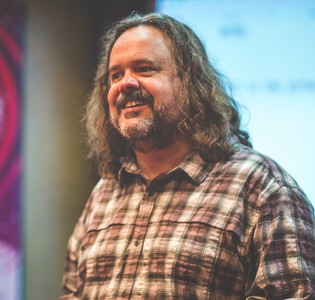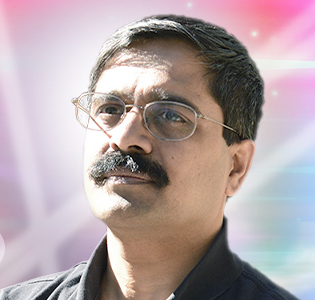Crafting a New Generation: The Role Models for India's AI Revolution

Read on to explore why it's crucial to value and recognize the master builders in India's tech industry and how we can nurture the next generation of these artisans.
India's tech ecosystem is abuzz with discussions around #GenAI, #FoundationModels, and #LLMs. Central to these conversations is a critical question posed by Ramkumar Narayanan, VP Technology & Managing Director at VMware: do we sufficiently value the art of building tech products, and do we celebrate the master builders of this craft in a way that can inspire and guide the younger generations, specifically Generation AI?
The tech ecosystem seems to place a high value on selling products. However, the focus on the individuals who design and create these products - the architects, designers, product managers, and engineers - is often lacking. Narayanan argues for the importance of recognizing "master builders" — those exceptional individuals who conceive and build every layer of the tech stack, from a full cloud to AI offerings. "We need to have master builders (I am not talking volume but the 10x individuals) who can conceive and build every layer of the tech stack like a full cloud or AI offering from India in order for us to aspire for global tech leadership," he says, suggesting that this level of mastery and dedication should be "valued and recognized" more widely in the Indian tech ecosystem.
The Artisan’s Mindset
Several tech leaders, such as Raghavendra Deshmukh, an Engineering Leader at Google, have agreed with this sentiment. Deshmukh compared the art of building tech to artistry, stating that builders should approach their work like artists, investing time and energy to perfect their craft. This mindset can be encouraged among engineers by fostering a culture that values creativity and innovation. By giving engineers the freedom to experiment, take risks, and rewarding those who strive for excellence and push the boundaries of what is possible, we can nurture the emergence of more artisans in the field. Deshmukh believes that this mindset could help engineers escape "process tangles" and become artisans in their field.
But how can we nurture this craftsmanship mindset? The answer lies in a synergistic relationship between the education system and the workplace.
Cultivating the Artisan’s Spirit
As Aniruddha Deswandikar, Senior Cloud Solution Architect at Microsoft Belgium, suggests, the education system needs to evolve to create more builders and innovators. At the same time, the workplace is paramount in maintaining high standards and encouraging craftsmanship. As Narayanan aptly puts it, "The [workplace] environment has a role to play since people are in school for 21 years but work life is probably 30+.”
To facilitate this synergy, adopting a more hands-on, experiential approach to learning is key. The workplace must also foster a culture that encourages continuous learning and innovation. By creating opportunities for employees to engage in challenging projects, facilitating mentorship programs, and providing resources for self-directed learning, we can create an environment that values and recognizes innovation, not just productivity. Deswandikar further advocates for increasing the publication of white papers and research papers by Indian product and startup companies to foster a culture of knowledge sharing and innovation.
Craftsmanship in Action
Stan Iyer, CTO at Cognizant, proposed a novel idea to amplify the visibility of master builders – the creation of a "Product Hall of Fame". Initiated by organizations like Nasscom, this would be a platform where peers can nominate and celebrate individuals who have made groundbreaking contributions in software products and technologies. It would spotlight the artistry involved in conceptualizing and building tech products, platforms, and technologies.
Shaju Nair, Product Leader at ServiceNow, validates this concept, citing the success stories of companies such as IBS Software and EcoEnergy Insights. These organizations, which have conceived, built, and marketed world-class products, exemplify the kind of role models that can inspire the next generation of tech innovators in India.
However, despite these promising initiatives and examples, challenges still remain.
Crafting Change
Nuthan Prasanna, Founder & CEO at Dvizira, highlights that the absence of a supportive ecosystem for R&D and deep tech product development presents a significant barrier. The challenges stem from bureaucracy, consumer attitudes, business constraints, and investment issues, coupled with a lack of long-term vision for value creation. To navigate these hurdles, a recalibration from a quantity mindset to a quality mindset is paramount. Koushik Banerjee, Founder & CEO at NOOS Technologies, encapsulates this perspective: "We need to start working towards quality from a quantity mindset. If we can create 10 global startups, that will be far more impactful than creating a million startups."
This shift towards quality necessitates a focus on creating products or services that offer significant value to customers, achieved through heightened innovation, addressing real-world problems, and generating globally competitive products. In this context, the spotlight is on fostering master builders and cultivating an environment that propels innovation and craftsmanship.
Indeed, overcoming these challenges mandates not just a shift in mindset, but a collaborative effort from all stakeholders in the tech ecosystem. As we chart our way forward, we are faced with a pivotal question: how can we, as a tech community, rise to this challenge and craft a future where India's tech artisan’s are not only global leaders in AI but are also celebrated for their craftsmanship?
Have questions or comments about this article? Reach out to us here.
Banner Image Credit: Ramkumar Narayanan's LinkedIn profile.








